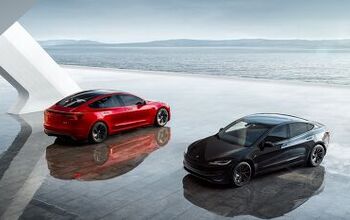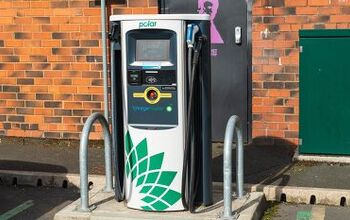Gas War: Justice Department Drops Antitrust Probe Against Automakers Siding With California

The United States Department of Justice has ended its investigation into Ford, Honda, Volkswagen, and BMW over a presumed antitrust violation stemming from a deal they made with California to adhere to regional emission rules. Their agreement technically circumvents the current administration’s plan to freeze national emissions and fuel economy standards — established while President Obama was still in office — at 2021 levels through 2026. Under the California deal, the automakers promised to comply with pollution and gas mileage requirements that are more stringent than the federal standards suggested in the rollback proposal.
But the probe also looked like retaliation from the Trump administration against automakers publicly siding with the state causing the most trouble in the gas war. Under the deal, the automakers promised to comply with pollution and economy requirements that are tougher than proposed federal standards. Despite the corporate promise being as empty as an Oscar speech, it was still an affront to the current administration’s efforts to tamp down lofty efficiency targets put in place just days before it came into power.
While the Justice Department hasn’t explicitly said why it closed the investigation, it’s presumed that it simply didn’t find anything that it felt violated antitrust laws. California Governor Gavin Newsom said on Friday that he wasn’t surprised by the decision, stating that the “trumped-up charges were always a sham, a blatant attempt by the Trump administration to prevent more automakers from joining California and agreeing to stronger emissions standards.”
Frankly, we don’t even think the two sides are having the same argument anymore.
California has focused on combating climate change and pushing new technologies while the Trump administration said it’s committed to maintaining jobs, lowering the cost of automobiles via deregulation, and providing consumers with choice. They’ve both been jerks about getting their own way, too. However, the validity of their respective arguments likely hinges upon your own personal perspective.
California offered tons of pushback against the whole rollback thing, going to great lengths to ensure its continued self-regulation while getting as many other states to adhere to its targets as possible. In September, the state’s authority to set auto mileage standards was revoked. The issue will likely be tied up in federal courts for years, as the Golden State isn’t going to go down without a struggle — and has been extremely litigious throughout.
Since the rollback proposal still has not been finalized, it’s not clear how drastic it will ultimately be. The Environmental Protection Agency previously suggested halting existing efficiency mandates in 2021 (with previous drafts issuing the freeze a year earlier), with nothing set in stone. The president said in December to expect the final draft within the next 12 months, noting that he anticipated continued legal problems from California.
Now that seems like a very safe assumption.
[Image: CC7/Shutterstock]

A staunch consumer advocate tracking industry trends and regulation. Before joining TTAC, Matt spent a decade working for marketing and research firms based in NYC. Clients included several of the world’s largest automakers, global tire brands, and aftermarket part suppliers. Dissatisfied with the corporate world and resentful of having to wear suits everyday, he pivoted to writing about cars. Since then, that man has become an ardent supporter of the right-to-repair movement, been interviewed on the auto industry by national radio broadcasts, driven more rental cars than anyone ever should, participated in amateur rallying events, and received the requisite minimum training as sanctioned by the SCCA. Handy with a wrench, Matt grew up surrounded by Detroit auto workers and managed to get a pizza delivery job before he was legally eligible. He later found himself driving box trucks through Manhattan, guaranteeing future sympathy for actual truckers. He continues to conduct research pertaining to the automotive sector as an independent contractor and has since moved back to his native Michigan, closer to where the cars are born. A contrarian, Matt claims to prefer understeer — stating that front and all-wheel drive vehicles cater best to his driving style.
More by Matt Posky
Latest Car Reviews
Read moreLatest Product Reviews
Read moreRecent Comments
- Bd2 Lexus is just a higher trim package Toyota. ^^
- Tassos ONLY consider CIvics or Corollas, in their segment. NO DAMNED Hyundais, Kias, Nissans or esp Mitsus. Not even a Pretend-BMW Mazda. They may look cute but they SUCK.I always recommend Corollas to friends of mine who are not auto enthusiasts, even tho I never owed one, and owned a Civic Hatch 5 speed 1992 for 25 years. MANY follow my advice and are VERY happy. ALmost all are women.friends who believe they are auto enthusiasts would not listen to me anyway, and would never buy a Toyota. They are damned fools, on both counts.
- Tassos since Oct 2016 I drive a 2007 E320 Bluetec and since April 2017 also a 2008 E320 Bluetec.Now I am in my summer palace deep in the Eurozone until end October and drive the 2008.Changing the considerable oils (10 quarts synthetic) twice cost me 80 and 70 euros. Same changes in the US on the 2007 cost me $219 at the dealers and $120 at Firestone.Changing the air filter cost 30 Euros, with labor, and there are two such filters (engine and cabin), and changing the fuel filter only 50 euros, while in the US they asked for... $400. You can safely bet I declined and told them what to do with their gold-plated filter. And when I changed it in Europe, I looked at the old one and it was clean as a whistle.A set of Continentals tires, installed etc, 300 EurosI can't remember anything else for the 2008. For the 2007, a brand new set of manual rec'd tires at Discount Tire with free rotations for life used up the $500 allowance the dealer gave me when I bought it (tires only had 5000 miles left on them then)So, as you can see, I spent less than even if I owned a Lexus instead, and probably less than all these poor devils here that brag about their alleged low cost Datsun-Mitsus and Hyundai-Kias.And that's THETRUTHABOUTCARS. My Cars,
- NJRide These are the Q1 Luxury division salesAudi 44,226Acura 30,373BMW 84,475Genesis 14,777Mercedes 66,000Lexus 78,471Infiniti 13,904Volvo 30,000*Tesla (maybe not luxury but relevant): 125,000?Lincoln 24,894Cadillac 35,451So Cadillac is now stuck as a second-tier player with names like Volvo. Even German 3rd wheel Audi is outselling them. Where to gain sales?Surprisingly a decline of Tesla could boost Cadillac EVs. Tesla sort of is now in the old Buick-Mercury upper middle of the market. If lets say the market stays the same, but another 15-20% leave Tesla I could see some going for a Caddy EV or hybrid, but is the division ready to meet them?In terms of the mainstream luxury brands, Lexus is probably a better benchmark than BMW. Lexus is basically doing a modern interpretation of what Cadillac/upscale Olds/Buick used to completely dominate. But Lexus' only downfall is the lack of emotion, something Cadillac at least used to be good at. The Escalade still has far more styling and brand ID than most of Lexus. So match Lexus' quality but out-do them on comfort and styling. Yes a lot of Lexus buyers may be Toyota or import loyal but there are a lot who are former GM buyers who would "come home" for a better product.In fact, that by and large is the Big 3's problem. In the 80s and 90s they would try to win back "import intenders" and this at least slowed the market share erosion. I feel like around 2000 they gave this up and resorted to a ton of gimmicks before the bankruptcies. So they have dropped from 66% to 37% of the market in a quarter century. Sure they have scaled down their presence and for the last 14 years preserved profit. But in the largest, most prosperous market in the world they are not leading. I mean who would think the Koreans could take almost 10% of the market? But they did because they built and structured products people wanted. (I also think the excess reliance on overseas assembly by the Big 3 hurts them vs more import brands building in US). But the domestics should really be at 60% of their home market and the fact that they are not speaks volumes. Cadillac should not be losing 2-1 to Lexus and BMW.
- Tassos Not my favorite Eldorados. Too much cowbell (fins), the gauges look poor for such an expensive car, the interior has too many shiny bits but does not scream "flagship luxury", and the white on red leather or whatever is rather loud for this car, while it might work in a Corvette. But do not despair, a couple more years and the exterior designs (at least) will sober up, the cowbells will be more discreet and the long, low and wide 60s designs are not far away. If only the interiors would be fit for the price point, and especially a few acres of real wood that also looked real.


































Comments
Join the conversation
I'll nominate my 2016 Prius. Weird headlight design and whackadoodle rear styling. The 2019's revisions are big improvements.
test